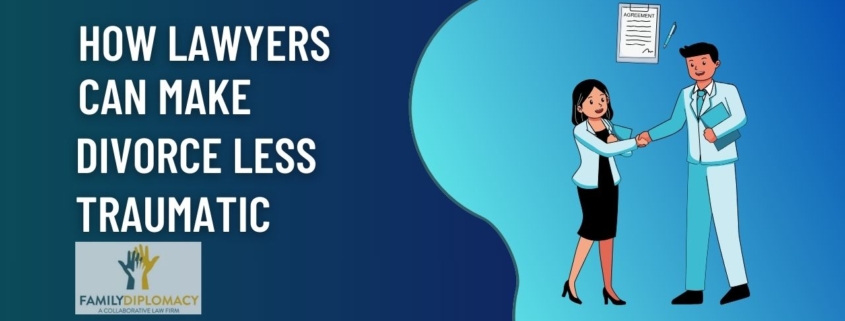How Lawyers Can Make Divorce Less Traumatic
If you are facing the prospect of divorce, there is a little discussed truth that you should know: The lawyer each of you choose will have a dramatic effect on whether your divorce becomes (i) a traumatic, drawn-out battle for the next several years or (ii) a thoughtful plan developed over several months that sets you and your family up for the next chapter of your lives.
Quick Answer: Yes, Your Choice of Lawyer Has a Major Impact on Your Divorce Experience
Different lawyers follow different philosophies. Traditional divorce lawyers often follow a system built for conflict (even if the lawyer genuinely is trying to help settle disputes), while Collaborative Divorce Attorneys focus on privacy, transparency, respect, and the family’s wellbeing.
Why Traditional Lawyers Often Turn Divorce Into a Battle
It is important to understand this from the start: traditional divorce lawyers are not trying to create trauma. They are not acting out of malice. They are doing exactly what they were trained to do. For generations, lawyers have been taught that the first step in a divorce is to draft a petition that asks for every possible form of relief. The logic is simple. In law school and in practice, attorneys learn that if they do not ask for something in the petition, a judge may refuse to award it later at trial.
But here is the problem: Very few families ever actually go to trial. More than 80 to 90 percent or more of Florida divorces end through settlement. And even if a case does go to trial, Florida law makes it clear that petitions can almost always be amended ahead of time. So the fearful approach of “ask for everything now or risk losing it forever” does far more harm than good.
The result is a petition that looks extreme and feels personal. You may see allegations you disagree with, requests for every type of alimony, demands for more than half the marital estate, and even demands that you pay all attorney’s fees. None of this sets a healthy tone.
Then comes service of process. Traditional training encourages serving papers through a sheriff or process server at the spouse’s home or workplace. For high-profile professionals especially, this can feel public, humiliating, and unnecessary. Understandably so, the “Respondent” (the spouse on the receiving end) often perceives all of this as a declaration of war, whether or not that was the “Petitioner’s” (the spouse initiating the divorce) intent.
From there, the traditional approach can shift or drift into depositions, interrogatories, subpoenas, and aggressive discovery. These tools often increase tension even when no trial will ever occur.
How Our Firm Starts Divorce in a Completely Different Way
At Family Diplomacy, we begin with something simple: respect. Unless there is a specific reason not to, one of the first things we do (in coordination with our client ahead of time, so no surprises) is reach out to your spouse privately. We explain that you want to move through this transition in a way that protects both spouses, preserves privacy, and supports the children, if any. We tailor our outreach to the situation. Sometimes a call is right. Sometimes a letter or email makes more sense. The tone remains steady and calm.
We also offer your spouse specific names and directories of collaboratively trained attorneys (such as through the websites of Next Generation Divorce, Tampa Bay Academy of Collaborative Professionals, or Sarasota Collaborative Family Law Professionals) who share our philosophy. When both sides choose professionals who value problem-solving over posturing, the entire process can shift from conflict to collaboration.
If we do need to file a petition, it is simple and neutral. The petition states only that there are issues to resolve, such as dividing assets and debts, and asks the court to approve the agreement once it is reached. We do not file accusations or emotionally charged claims. Nothing is designed to embarrass or escalate.
We only use process servers as a last resort, not a first resort, if we otherwise are unable to bring your spouse to the table. However, your spouse can always e-sign a waiver of service of process, making the entire embarrassing “You’ve been served” trope unnecessary.
How Interest-Based Negotiation Creates Better Outcomes
Traditional divorce, as it is by design within an adversarial process, encourages positional bargaining. One side demands something extreme. The other responds with their own extreme position. Negotiations become a tug-of-war.
Our firm follows the interest-based negotiation model taught through the Harvard Negotiation Project. Instead of arguing about positions, we help both spouses uncover their real concerns. When interests guide the process, agreements become easier, faster, and more durable.
We also specialize in working inside the Collaborative Divorce Process, which requires full transparency. A Neutral Financial Professional gathers and explains the financial information. A Neutral Facilitator helps improve communication and reduce emotional strain, as well as keeping the focus on the future rather than the fights of the past. This team approach keeps everyone focused on solutions that meet the family’s long-term needs.
As someone who has helped develop ethical standards for Collaborative Divorce in Florida and taught judges and professionals across the U.S., Canada, Europe, and the Middle East, I have seen how powerfully this model works, especially for lawyers, doctors, professionals, and other public figures and their spouses. By the way, you can read a bit more about my background here.
Protecting Your Privacy and Dignity Throughout the Process
Collaborative Divorce allows us to protect your privacy in ways traditional litigation cannot. According to most traditional divorce lawyers, you are required to file in the county where you last lived together. That exposes your finances and personal life to public inspection from local actors. This is because court files are public files.
What most traditional divorce lawyers fail to tell you is that you can actually file in any county in Florida upon agreement. In most of my Collaborative Divorce matters, we file in a different county far from where the family lives and works. And in many cases we can keep detailed financial disclosures and even the agreement itself out of the public file. For professionals and public figures, this protection is invaluable.
Once you reach an agreement, we move quickly to finalize your divorce. You avoid court hearings, avoid public drama, and avoid the emotional fallout created by adversarial tactics.
If you want a lawyer who respects your time, your privacy, and your dignity, we invite you to schedule a private virtual planning meeting or call Family Diplomacy: A Collaborative Law Firm by clicking the button below.
You are not alone. We can help.
We accept clients in every county in Florida, and we have offices (by appointment) in Tampa, St. Petersburg, and Sarasota.







